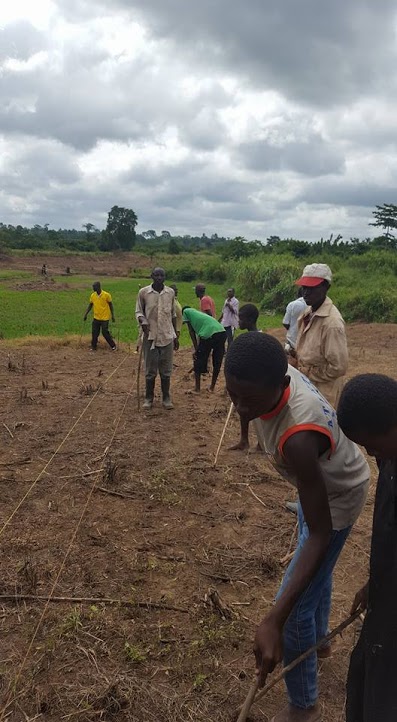
This story is a guest post by Isaac Paul. Isaac is from Muscatine, Iowa. He took a six month leave of absence from Trioak Foods in Oakville, Iowa to serve as a full-time volunteer with Self-Help International’s Young Adult Training Center in Ghana. Read the full length article at Wallace’s Farmer’s online magazine.
Four months ago, I packed my bags and flew to Ghana, West Africa, to work with farmers to help them better feed their families. The farmers I’ve met are not so different to the farmers back home in Iowa. They’re hardworking stewards of the land, seeking to provide for their children in the best way possible.
One of my favorite days here in Ghana was when we went to the village of Bedaabour last month to plant demonstration plots near the local school for all to see. We used these demonstration plots to show – not tell – farmers how these practices can help them grow more food. By intercropping and utilizing cover crops, farmers are able to increase land efficiency and food production, control weeds, decrease evaporation, enrich the soil, and reduce runoff and erosion. Crops like corn – called maize in Ghana – mine the soil and do not add nutrients. Legume crops like mucuna, cowpea (black-eyed pea), and groundnut (peanuts) can be grown intercropped or planted as individuals for crop rotation and will effectively fix nitrogen in the soil in addition to providing food to eat.

Farmers learn to plant QPM
This trial will show farmers how to increase land potential and how to control weeds with intercrop canopy. All four demonstration plots contained Quality Protein Maize (QPM), a high protein corn that the local school uses to make a breakfast porridge for their students. One plot was QPM planted without a cover crop, QPM planted with green gram (a small pulse crop), QPM with cowpea, and QPM with groundnut. The latter two cover crops can be harvested and mixed into the school porridge for even further added nutrition and ensure the kids are able to get the nutrients they need to reach their biological potential.
Days like these are my favorite. I love the opportunity to go to rural communities and meet farmers, for they are the heart of Ghana. Self-Help’s model works to not only ensure children are fed for the day in school, but also that their parents are able to provide for them at home and for years to come. Today, their parents are growing more food and more nutritious food. Through these improved practices, we’re alleviating hunger by helping people help themselves.

Powered by Wapiti Digital #servetheherd
This is my rich text.
This is more rich text.
I am a list
Lists are cool